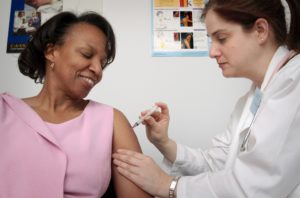 As a mom, I am used to putting my kids’ well-being first, often forgetting my own health for the sake of theirs. There are days I live off of the food that falls from the highchair because I am too busy making meals for kids. I schedule appointments for them, but put off the ones I should make for myself. But, as a nurse practitioner in family practice, I know that routine regular preventative medical care and early detection and treatment of disease are essential for everyone, especially moms. In the last year, I have also done more for myself to ensure that in addition to taking care of my kids and my patients, I am also caring for myself.
As a mom, I am used to putting my kids’ well-being first, often forgetting my own health for the sake of theirs. There are days I live off of the food that falls from the highchair because I am too busy making meals for kids. I schedule appointments for them, but put off the ones I should make for myself. But, as a nurse practitioner in family practice, I know that routine regular preventative medical care and early detection and treatment of disease are essential for everyone, especially moms. In the last year, I have also done more for myself to ensure that in addition to taking care of my kids and my patients, I am also caring for myself.
Below are a few standard screenings and evaluations that are important for all women, but especially moms, as we seek to care for ourselves so that we can care for our children.
 Annual well visits: Annual routine physicals with a primary health care provider are more critical than many mothers may realize. During a routine exam, a woman is screened for high blood pressure, risk factors for diabetes and high cholesterol, skin health, high-risk behaviors that may contribute to disease like smoking, and mental health problems. Discussions cover diet and exercise as well as other preventative measures that can prevent injury or disease. The well visit is also a time to bring up concerns that may require further testing or follow-up.
Annual well visits: Annual routine physicals with a primary health care provider are more critical than many mothers may realize. During a routine exam, a woman is screened for high blood pressure, risk factors for diabetes and high cholesterol, skin health, high-risk behaviors that may contribute to disease like smoking, and mental health problems. Discussions cover diet and exercise as well as other preventative measures that can prevent injury or disease. The well visit is also a time to bring up concerns that may require further testing or follow-up.
Pap smears: Pap smears are a critical screening tool for the early detection of cervical cancer. Current guidelines recommend screening women 21-30 years every three years and women over 30 years of age every five years if testing is normal. For women with a history of abnormal pap smear testing, screening is required more frequently. Ask your health care provider how often you should have screening based on your individual history and risk factors.
Breast exams: Though breast self-exams at home are no longer routinely recommended because the evidence is lacking on their overall effectiveness, knowing your healthy breast tissue is key. Your health care provider may do a clinical breast exam as part of a well exam. Having a discussion with your health care provider about mammograms to detect breast cancer is recommended beginning at age 40 years. In cases of significant family history or concerning clinical findings, a mammogram may be recommended at an earlier age so it is important to consult your health care provider regarding your overall breast health.
Mental health evaluation: Many moms deal with depression and anxiety, among other mental health problems. Unfortunately, these conditions often persist with inadequate treatment. Counseling can be beneficial in working through both parenting and relationship issues, but some women need medication or other intervention to feel better. Mental health is something you can talk with your primary care provider about initially. They can direct you to a counselor, psychologist or psychiatrist as needed.
 Fatigue evaluation: Being a mom is tiring. It’s often normal to feel exhausted at the end of the day. However, some health problems involving the thyroid, vitamin deficiencies, or anemia (to name a few) can also cause fatigue. Simple blood testing often gets to the bottom of the issue easily so if you believe you are more tired than you should be, go see your health care provider to discuss further testing to evaluate for causes of fatigue.
Fatigue evaluation: Being a mom is tiring. It’s often normal to feel exhausted at the end of the day. However, some health problems involving the thyroid, vitamin deficiencies, or anemia (to name a few) can also cause fatigue. Simple blood testing often gets to the bottom of the issue easily so if you believe you are more tired than you should be, go see your health care provider to discuss further testing to evaluate for causes of fatigue.
Sources:
https://ww5.komen.org/BreastCancer/BreastSelfExam.html
.










